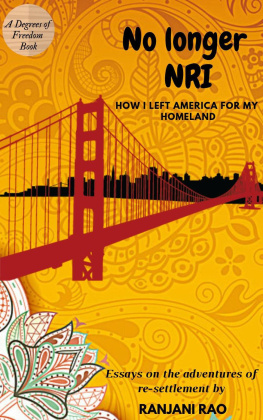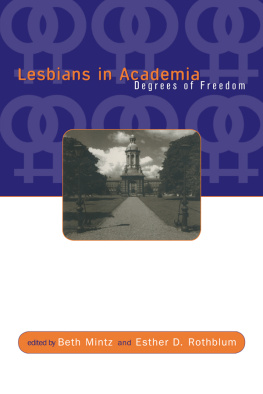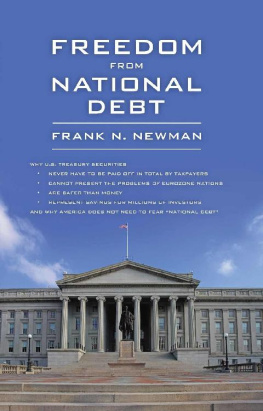Ranjani Rao - No Longer NRI: How I Left America for My Homeland: Degrees of Freedom, #1
Here you can read online Ranjani Rao - No Longer NRI: How I Left America for My Homeland: Degrees of Freedom, #1 full text of the book (entire story) in english for free. Download pdf and epub, get meaning, cover and reviews about this ebook. year: 2019, publisher: Story Artisan Press, genre: Home and family. Description of the work, (preface) as well as reviews are available. Best literature library LitArk.com created for fans of good reading and offers a wide selection of genres:
Romance novel
Science fiction
Adventure
Detective
Science
History
Home and family
Prose
Art
Politics
Computer
Non-fiction
Religion
Business
Children
Humor
Choose a favorite category and find really read worthwhile books. Enjoy immersion in the world of imagination, feel the emotions of the characters or learn something new for yourself, make an fascinating discovery.
- Book:No Longer NRI: How I Left America for My Homeland: Degrees of Freedom, #1
- Author:
- Publisher:Story Artisan Press
- Genre:
- Year:2019
- Rating:5 / 5
- Favourites:Add to favourites
- Your mark:
- 100
- 1
- 2
- 3
- 4
- 5
No Longer NRI: How I Left America for My Homeland: Degrees of Freedom, #1: summary, description and annotation
We offer to read an annotation, description, summary or preface (depends on what the author of the book "No Longer NRI: How I Left America for My Homeland: Degrees of Freedom, #1" wrote himself). If you haven't found the necessary information about the book — write in the comments, we will try to find it.
Ranjani Rao: author's other books
Who wrote No Longer NRI: How I Left America for My Homeland: Degrees of Freedom, #1? Find out the surname, the name of the author of the book and a list of all author's works by series.
No Longer NRI: How I Left America for My Homeland: Degrees of Freedom, #1 — read online for free the complete book (whole text) full work
Below is the text of the book, divided by pages. System saving the place of the last page read, allows you to conveniently read the book "No Longer NRI: How I Left America for My Homeland: Degrees of Freedom, #1" online for free, without having to search again every time where you left off. Put a bookmark, and you can go to the page where you finished reading at any time.
Font size:
Interval:
Bookmark:
No Longer NRI
How I Left America
for My Homeland
Ranjani Rao
No Longer NRI Copyright 2019 by Ranjani Rao. All Rights Reserved.
Cover Design by Anuradha Vajjala
All rights reserved. No part of this book may be reproduced in any form or by any electronic or mechanical means including information storage and retrieval systems, without permission in writing from the author. The only exception is by a reviewer, who may quote short excerpts in a review.
Ranjani Rao
Visit my website at www.storyartisan.com

First Printing: March 2019
Story Artisan Press
 |  |


I left India as a diffident young bride, apprehensive about leaving behind all that was familiar, but eager to embark on a new phase of life. The news of my whirlwind arranged marriage followed by my departure for America had been met with unstinted support and approval by my large circle of family and friends.
Over the course of the fourteen years I lived abroad, I acquired many skills, earned a doctorate, and became a mother. I became equally comfortable in both India and the U.S., effortlessly switching between cruising on American freeways and bargaining with street vendors on my annual visits to Bombay.
My decision to return to India in 2003 was not received with the whole-hearted endorsement that I had expected. Instead, it sparked many discussions, debates, and disagreements within and beyond my circles in both countries. A few people even observed the irony that my situation was similar to the return of Lord Rama after fourteen years in exile. However, unlike Rama who had been banished, I had left voluntarily.
The decision to return, however, was taken after much soul-searching. Even so, neither the parting nor the settling down were easy. As Khalil Gibran said so eloquently in The Prophet,
It is not a garment I cast off this day, but a skin that I tear with my own hands.
The essays that you are about to read were published between December 2003 and November 2004 in the California-based magazine, India Currents. They comprised a monthly column titled Round Trip and are a record of my thoughts and reflections at the time. They are about leaving a familiar foreign country and returning to a country, that was ostensibly my own, but to which I was returning as a virtual stranger.
I received many positive comments and emails after each essay was published. Many readers wrote to say that my experiences had helped clarify their thinking and that it had facilitated honest discussions about the ramifications of returning to India.
I hope you find these chronicles of a returned Non-Resident Indian (NRI) interesting and helpful, whether you are within or outside your home country and whether or not you are considering a move. After all, every life is a journey, regardless of whether you stay in one place, live like a global nomad, or end up being something in between.
 |  |


O ne popular urban legend that is familiar to the Indian immigrant community deals with the so-called x= x+1 syndrome. This equation is a mathematical representation of the dilemma faced by the well-established Indian immigrant (typically a male) who embraced America and its values in his youth and prospered in ways that eluded his peers who remained in India.
For such an individual, the early years are euphoric as they are spent pursuing professional success and material wealth. But, as mid-life looms, the person feels a little less certain and a little more lonesome. He starts to experience conflicting emotions. On one hand is the reality of his well-constructed American life. On the other is a growing awareness of the importance and accompanying yearning for the Indian values with which he was raised.
Although the prospect of moving back to India appeals to him, he realizes that he is reluctant to give up the comforts, peaceful monotony, and predictable routine of his American life. He therefore consoles himself by deciding that he will eventually move to India. But, he sets the actual date of return to the following year. Thus, x is the current year while x+1 represents the next year, the year of his return.
In some ways I am that immigrant and I am facing the same dilemma.
I have spent more than a third of my life in America enjoying an easy life surrounded by material comforts. But, it is not just the tangible luxuries that have enriched my life.
I can never forget the pride I felt when I was awarded my doctorate, a distinction that I earned with considerable hard work and grit. A comparable moment was being comforted by competent and caring nurses after I burst into tears during a particularly tough time.
On the flip side, I cannot forget the feeling of humiliation when I was abruptly asked to leave during a job interview because I did not have a green card.
As I mentally review these years, I realize that all of my experiences, good and bad, have enriched and enlightened me beyond what I could have imagined.
So, the x=x+1 equation is slightly different for me. I think of x as the number of amazing experiences I have had and x+1 as the next one that I am sure to have if I continue to live here.
Although I am not the typical middle-aged male immigrant grappling with a mid-life crisis, there are days when I think of nothing but returning to India.
On hot summer days I long to wear a sari from my vast collection and step out without drawing a second glance from strangers. At times I am tired of explaining the bindi on my forehead or defending my arranged marriage. On a cold and lonely Diwali day I wish for an official holiday so I can celebrate it at home, and so I dont have to describe the origins and significance of the festival for the nth time to curious colleagues. On days when I feel particularly incompetent as a mother, I become aware of the all the wisdom I still need to imbibe from my parents. On all these days, x becomes the number of compelling reasons that I have listed for returning to India and x+1 is the one I have not yet realized or sufficiently articulated.
So, even as I vacillate between these conflicting emotions, I remind myself that ultimately home is a place where one can fully engage in the pursuit of happiness. I know in my heart that I can pursue happiness in both countries; and, that is the basis of my predicament. If I lived in a society where I was constantly treated unfairly because I am a woman or because I am a minority, the decision to leave would not be so vexing.
Regardless of the subtle and not-so-subtle differences between the two cultures, I am fully aware that the lessons I have learnt in my life are truly universal. Humans all over the world are more alike than they are dissimilar even though we tend to dwell on our differences. Living peaceful lives, making a decent living, and raising a family with strong ethical values, are universal goals. Extraordinary people are everywhere.
Next pageFont size:
Interval:
Bookmark:
Similar books «No Longer NRI: How I Left America for My Homeland: Degrees of Freedom, #1»
Look at similar books to No Longer NRI: How I Left America for My Homeland: Degrees of Freedom, #1. We have selected literature similar in name and meaning in the hope of providing readers with more options to find new, interesting, not yet read works.
Discussion, reviews of the book No Longer NRI: How I Left America for My Homeland: Degrees of Freedom, #1 and just readers' own opinions. Leave your comments, write what you think about the work, its meaning or the main characters. Specify what exactly you liked and what you didn't like, and why you think so.









